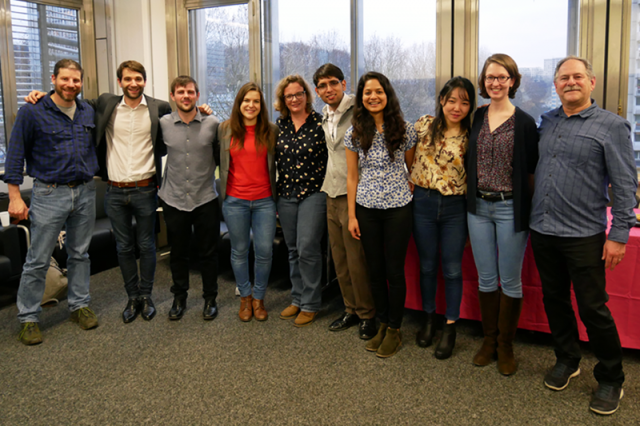The NCCR Chemical Biology awarded the Best Master’s Thesis prize to Manuel Merz for his outstanding Master’s thesis. This honour acknowledges the exceptional achievement of a young scientist enrolled in the Master in Chemical Biology programme.

Your Master’s thesis was entitled “Screening for sulphonamides small molecule inhibitors of mTORC2 signaling”. Can you quickly summarize in what it consisted?
The Mammalian Target of Rapamycin kinase mTOR assembles into two complexes termed mTORC1 and mTORC2, which regulate cell growth, proliferation and survival in response to intra- and extracellular stimuli. Whereas mTORC1 is acutely inhibited by rapamycin, inhibitors specific to mTORC2 are currently lacking. In order to get a better understanding of its implications in cell proliferation and survival, we aimed to develop inhibitors selective to mTORC2. To achieve this, we chose to focus on mSin1, an essential subunit of mTORC2 that enables plasma membrane localization and thus regulation of downstream signaling. We purified the Pleckstrin Homology (PH) domain of mSin1 and used it to screen a sulfonamide PNA encoded library for specific binders of the protein. These binders could possibly inhibit the interaction of mSin1 with Phosphatidyl inositides (PI), preventing localization of mTORC2 to the plasma membrane, which is critical for its activity. These small molecules could provide a valuable tool to better characterize downstream mTORC2 signaling and may eventually find utility in treating cancers associated with hyper activation of the complex.
After graduating from your Bachelor’s degree in biochemistry at the University of Fribourg, you were interested in learning more about applications of chemistry onto biology. Did the curriculum of the Master in Chemical Biology meet your expectations?
Yes, definitely. I would even say it exceeded my expectations. This program offers a highly interesting and unique variety of topics in the fields of chemistry, biology, biochemistry and biophysics. It enables the students to combine the courses rather freely and thus allows them to personalize their curriculum. I appreciated this flexibility a lot.
During your thesis you were working in both the Winssinger group in Organic Chemistry and the Loewith group in Molecular Biology. What lessons did you learn from this experience?
There are a few things that come to my mind. It was great to work in these two different groups due to the different fields they pursue research in. I learnt many important lessons while conducting interdisciplinary research during my Master thesis project. First of all, despite already having theoretical knowledge in both Organic Chemistry and Molecular Biology at the beginning of my project, I soon found that many things are different in the lab reality and I had to adapt to them. Secondly, working in two different labs at the same time is sometimes tricky in terms of organization and communication. Overall, despite all of the difficulties, it was a highly enriching experience. I am certain that many of the skills I learned throughout the project will be useful in the future.
What was the most interesting experience during your Master’s thesis?
It was amazing how I got quickly integrated in both groups, in both of which I met many great people. Throughout my time in those both labs I had countless interesting discussions with my colleagues, which have not only allowed me to enlarge my knowledge but also to advance my project.
What would you do differently if you could start your Master’s degree all over again?
There is not much that I would do differently. I am very satisfied with how my Master’s degree turned out. Maybe I would try to fit more courses into my schedule in order to make the most of the knowledge that is present in the NCCR Chemical Biology. Personally, I realized that I have to pay more attention to my own time management.
What are your plans for the future?
Because I enjoyed the lab experience during my Master’s thesis, I decided to continue conducting academic research. In May 2018 I will start a PhD at the EPFL, still within the NCCR realm and I look very much forward to this new adventure. I have not decided yet what my plans are for the long term, but I could also picture myself doing work outside academia.

Leave a comment
The editors reserve the right not to publish comments or to abridge them.